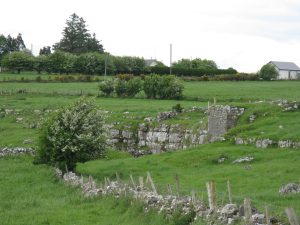As mentioned in “The Irish Pimpernel” and “A helpful suggestion” I have been unable to find Patrick in 1900 or 1901. I started to wonder what I would have done in his situation. What was that situation?
His father, John, had died in 1898 when Patrick was 15. By some distance (10 years), he was the youngest child of his father’s second marriage. The oldest two (John, b 1866 and Mary, b 1868) had gone to England and were living in Dewsbury at the turn of the century. He never knew the third child, Michael (b 1870, d 1879). The brother closest to him in age, Thomas (b 1873) was in poor health. (He died as a consequence of asthma in 1908. See ‘Thomas Stanley, b 1873’)
When growing up, he must have been aware of the consequences of the shrinking population. Between 1881 and 1901, the population of Roscommon dropped by 23%, from 132,000 to 102,000. (It had been over a quarter of a million in 1841.) There were abandoned and derelict buildings scattered across the lush green countryside.
There would have been stories filtering back from members of the diaspora. No doubt the stories would have been selective in their portrayal of the realities of life elsewhere. The truth, but not necessarily the whole truth. By the standards of today, life in a ‘back-to-back’ house in a big city was grim. But, perhaps, it was slightly less grim than life had been back in Ireland.
Patrick was barely educated. He was young and physically fit. He was poor, and his prospects were poor. The only work open to him was as an agricultural labourer.
Faced with these circumstances, a decision to leave Ireland makes perfect sense. And he did leave. I just do not know exactly when he left. Neither his brother, Thomas, or his mother are recorded on the 1901 Census for Roscommon. They both died there, in 1908 and 1909 respectively. Somehow, they were missed. If they were overlooked, perhaps so was he. They would not have gone on a family holiday somewhere!
Equally, in terms of probability, Patrick could have disappeared for pastures unknown sometime shortly after the death of his father in 1898. He would have been 15. He probably regarded himself as a fully capable adult, as 15 year olds commonly do, even today.

